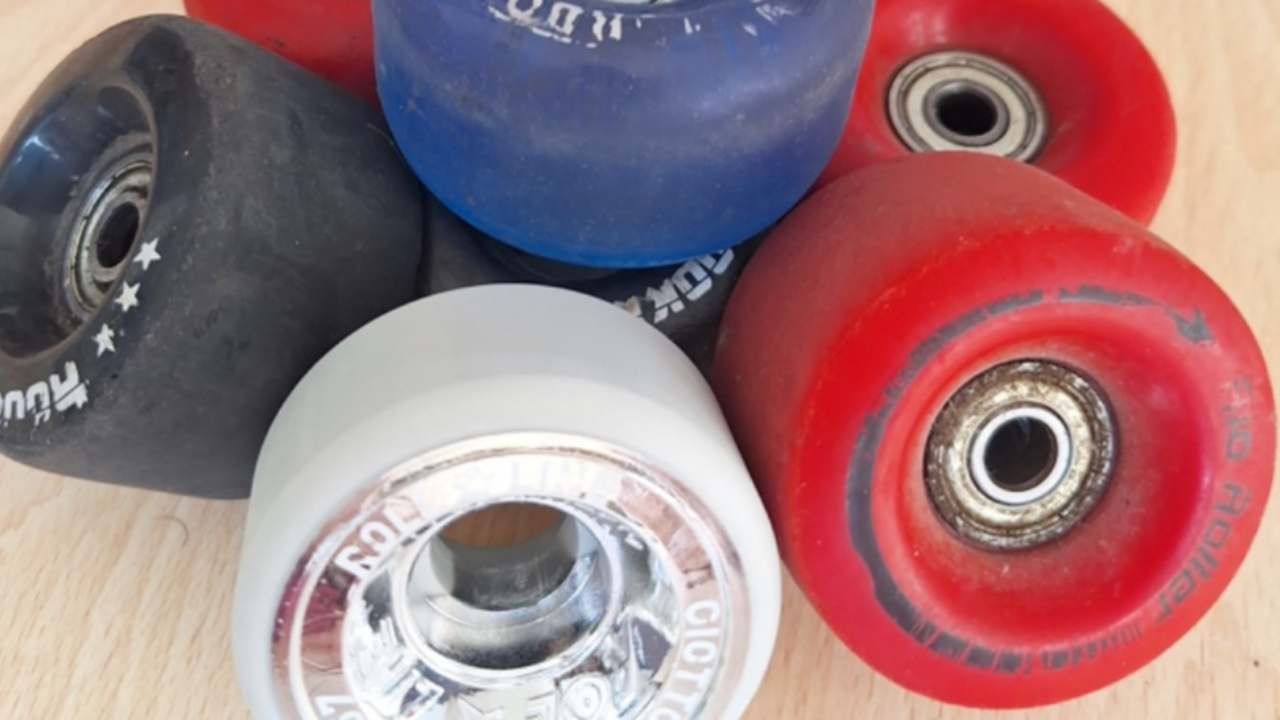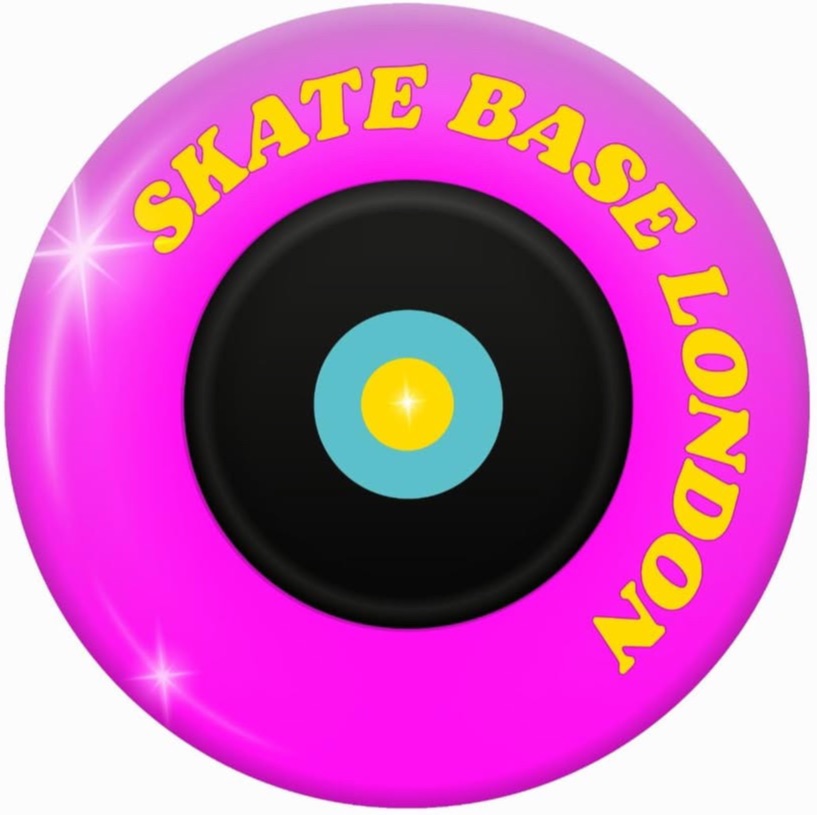
When it comes to choosing the right wheels for your roller skates, one of the most important factors to consider is wheel hardness. Whether you're chopping it up through the streets of London, finessing your way around Rollernation, or getting into your jam in an underground car park, your wheel choice can dramatically impact your performance, comfort, and overall skating experience. But what does skate wheel hardness mean, and how do you pick the right one? Let’s get into it.
Understanding Skate Wheel Hardness: The Durometer Scale
Skate wheel hardness is measured on the durometer scale, which is indicated by a number followed by the letter A (e.g., 78A, 90A, 101A). The number is normally printed on the front of the wheel along with the brand name. The higher the number, the harder the wheel, so:
Soft wheels (78A – 85A) → More grip, better shock absorption. This is ideal if you are a fearful new skater and need a bit more stability, or are pretty advanced in skill, but utilising your skate edges [and like the extra grip so as you don’t slide out]. Most UK Street skaters go for a 78A Airwave set on their hockey skate conversions [as the wheels are nice and large, offering more speed and smoother rolling experience].

Medium wheels (86A – 95A) → Balanced for indoor and outdoor use. When I’m enjoying certain styles like jam or artistic, I use my 92A Rolline Wheelset. They offer just enough grip without hindering the wheel rotation when I spin.
Hard wheels (96A – 101A+) → More slide, less grip, better for smooth indoor surfaces. Harder wheels are not as good at cushioning you from the roughness of many outdoor surfaces. However, these are what you’re after if you like to slide or add a little fire to the pace of your spins!
Overall, wheels using the A scale tends to be the preferred choice for most recreational skaters who up up for a jam to some nice tunes or a street skate.
Beyond the A Scale: Harder Wheels for Artistic Skaters
For more aggressive park skaters, some opt to use a B scale (e.g., 84B), which measures wheels 20 points lower than the A scale. For example, an 84B wheel is equivalent to a 104A—extremely hard [you’ll see those skaters rotating and sliding sideways down the half pipe on a whim]!
For artistic skaters, particularly those practising figures, dance, and freestyle skating, skate wheel hardness often goes beyond the standard A scale. Some brands, like Roll-Line, use a B scale or their own proprietary measurement systems. These wheels are typically harder than 101A, offering extreme precision and minimal grip for executing spins, jumps, and intricate footwork.
Roll-Line’s artistic wheels, for example, come in hardness ratings from around 47D to 61D, which are significantly harder than the highest A-scale ratings [I used the hardest of them for around a year—boy do they slide]! These wheels are designed for polished wooden floors or coated competition surfaces, where grip can slow down movement or affect technique. The harder the wheel, the faster and more responsive it becomes, but they do require a higher skill level to manage them safely.
As a beginner or improver level skater, the A scale is all you need as you develop your skills, so lets explore their pros and cons further.
Soft vs. Hard Skate Wheels: Which Should You Choose?
Soft Wheels (78A – 85A)
Best for: Outdoor skating, rough streets, boardwalks, beginner skaters
Absorb shock from rough surfaces
Provide a smoother, more stable ride
Offer better grip on uneven or slippery terrain
Ideal for skaters who want comfort and control over speed
❌ Downside: Not great for sliding or quick turns on smooth floors
Medium Wheels (86A – 95A)
Best for: Hybrid skating (indoor/outdoor), rhythm/jam skating and street skating.
Offer a mix of grip and speed
Great for transitioning between surfaces
Suitable for skaters who need versatility
❌ Downside: May still feel too soft for speed skating and too hard for rough outdoor terrain

Hard Wheels (96A – 101A+)
Best for: Indoor rinks, skate parks, artistic and speed skating. If you like a rink jam, those hard wheels will give you more bang for your effort [providing that you have the skills to hold your form].
Fast and responsive on smooth surfaces
Less friction = better for spins, slides, and tricks
Commonly used for jam skating, artistic skating, and roller derby
❌ Downside: Very little grip outdoors; bumpy and uncomfortable on rough pavement
Choosing the Right Wheel for Different Surfaces
SurfaceRecommended Hardness
Rough outdoor pavement 78A – 85A (soft wheels)
Indoor wooden rink 95A – 101A (hard wheels)
Smooth outdoor tracks 85A – 90A (mid-range)
Skate parks & bowls 97A+ (hard wheels for slides & tricks)
Street skating (urban) 78A – 88A (for grip & comfort)
Bearings And Your Wheel Setup
While skate wheel hardness is key, your bearings also affect performance. Bearings are rated on the ABEC scale (1, 3, 5, 7, 9), with higher numbers indicating more precision. However, for roller skating, the ABEC rating isn’t the only thing to consider—quality matters more.
Steel bearings: Affordable, and durable, but need regular maintenance. Just be mindful to dry them thoroughly if you find yourself skating outside in wet conditions.
Ceramic bearings: Expensive, roll smoother, less maintenance needed. They’re also better at resisting the negative effects of skating in wet conditions.
Swiss bearings: Premium quality, long-lasting, and high-performance
Proper cleaning and lubrication will keep your wheels spinning fast, regardless of the bearings you choose.
What Are Skate Wheels Made Of? (PU and Beyond)
Most modern roller skate wheels are made from polyurethane (PU), a durable and versatile material that provides:
✔ Long-lasting wear
✔ Good grip and control
✔ Shock absorption for comfort
Other Skate Wheel Materials
Plastic wheels (found on cheap skates): Not recommended! Slippery, poor performance, and low durability.
Rubber wheels (sometimes on beginner skates): Better than plastic but wear down quickly.
Hybrid materials (mix of PU and other compounds): Designed for specific skating styles, like park or speed skating.
Final Thoughts: Finding Your Perfect Skate Wheel Hardness
Choosing the right skate wheel hardness comes down to your skating style, surface, and comfort needs. If you're mainly skating outdoors, softer wheels (78A-85A) will keep things smooth. If you're an artistic or jam skater, hard wheels (96A-101A) will give you the speed and precision you need. And if you're somewhere in between, medium wheels (86A-95A) offer the best of both worlds.
So, are UK skaters hard? The answer depends on where and how you choose to roll!
Kelly
Cranial Osteopath | Wellbeing Coach | Roller Skate Instructor
What’s your preference when it comes to wheel hardness? Share your thoughts, ideas, and perspectives in the comments below.
Click HERE to read other articles.



